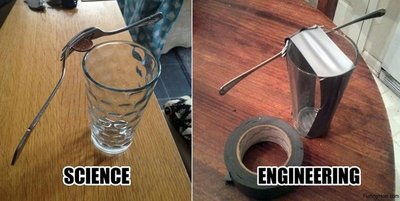"Science" - research in the natural sciences
The natural sciences are about exploring the natural world and expanding our knowledge of its fundamental principles. Theories are formulated, experiments are carried out and observations are made in order to gain new insights. As a result, researchers develop a deep understanding of how the world works, but do not need to be able to apply this knowledge directly to new problems or questions.
"Engineering" - engineering development
Engineering focuses on the application of acquired knowledge to solve practical problems and develop innovative solutions. Engineers use their understanding of the laws of nature to design technologies, systems and products that meet the needs of society. In doing so, they face current challenges, find creative solutions and develop new technologies and innovations.
Industrial logistics - science or engineering?

The answer is as simple as it is difficult: both.
In our department we deal with both aspects. Although this does not make research any easier or faster, it does give us the opportunity to understand mechanisms in logistics and to make customised recommendations for action or define innovative solutions on the basis of these findings.
Which of the two aspects is predominant depends strongly on the direction that is to be researched:
- Management-oriented research, whose target group is strategic decision-makers, tends to be categorised as "Science". It attempts to establish theories about certain mechanisms and validate them empirically. If this is successful, important findings can be derived for the future. A research method for this could be the expert interview (click here for an example) - but more on this on the research methods page.
- Application-orientated development, whose target group is operational decision-makers, is more likely to be classified as "Engineering" . The aim is to solve specific problems in operations. Examples of this can be the conceptual design of IoT systems (click here for an example) or the development of material flow simulations that can be used to test various scenarios or layouts. This can create direct and applied insights or innovations that can improve the operation of production and logistics.
Other universities, such as Boston University or the University of British Columbia, also deal with the distinction between science and engineering.
